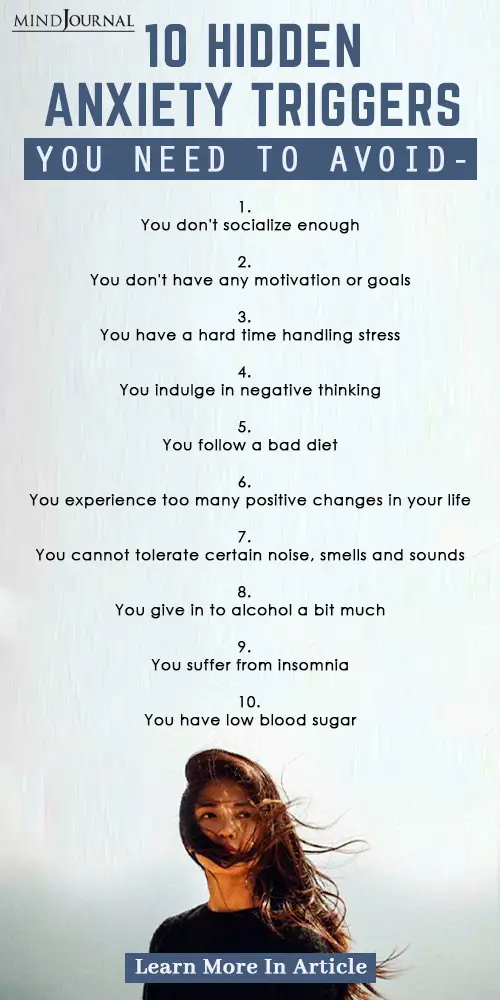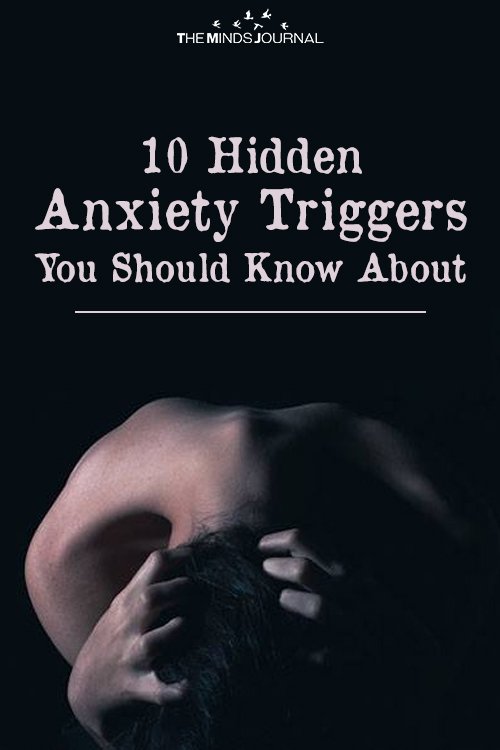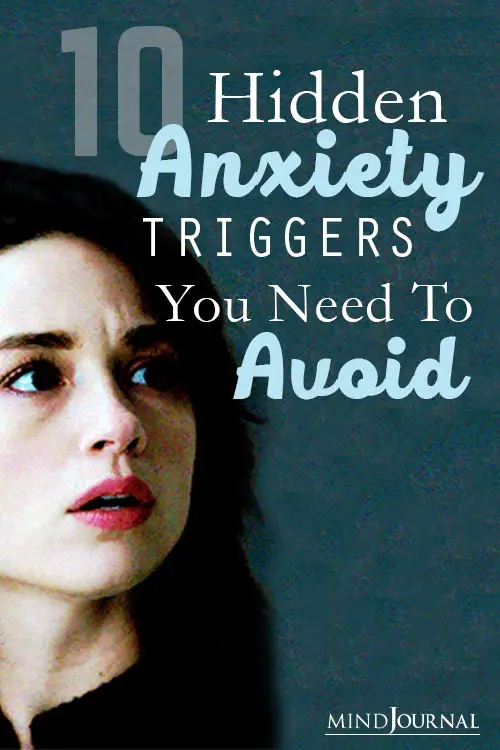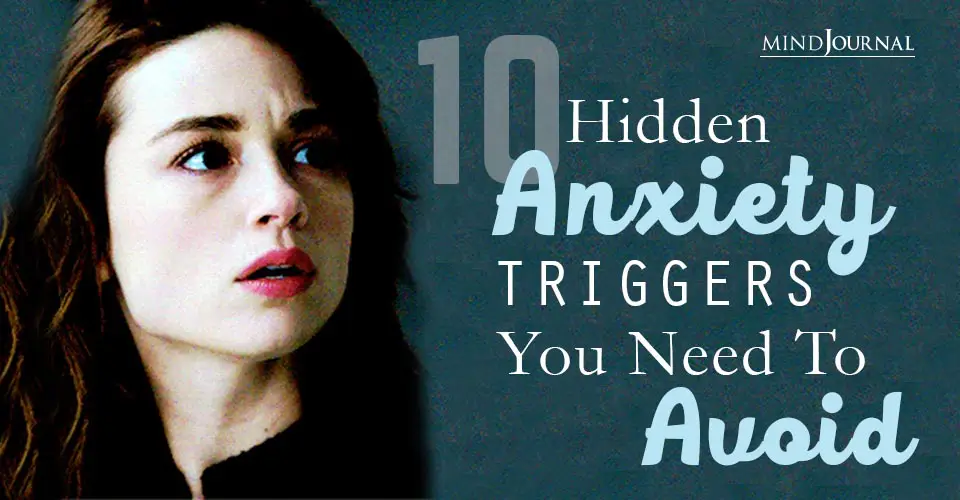Do you know that there are many covert anxiety triggers, that people who suffer from anxiety have absolutely no idea about?
Anxiety knows no gender, no social class, or race. It is proven that more than 40 million people in the United States alone suffer from anxiety. Anxiety can start after a stressful or emotional event but it can also start without any cause or warning sign. It usually gives us very little time to prepare (if any) and before we know it, we are already having a full-blown anxiety attack.
When it comes to anxiety, we need to look at it in two different ways. First off, there might be situations or things in our lives that in return might “cause” anxiety. However, in this article, we want to look at the other factor, meaning what might possibly “trigger” anxiety, the factors we usually overlook and fail to pay attention to. If we can identify some of these major hidden triggers, we can find ways to hopefully eliminate them from our lives.
Here Are Some Hidden Anxiety Triggers You Should Know About

1. Not socializing enough
We always hear about people feeling anxious or having panic attacks when they are in a crowded environment, but we fail to recognize that the complete opposite, can in fact trigger anxiety just the same. If we do not socialize enough, then we spend a lot of time on our own and with our own thoughts.
It is good to know ourselves and listen to ourselves but every once in a while we need to go back to our social lives in order to function healthily among people. We also need this socializing to not lose touch with reality and be able to feel empathy for others. Spending more than enough time on our own, will eventually distort our thoughts and cause anxiety.
Related: What Triggers Your Anxiety Most, Based On Your Zodiac Sign
2. Not having motivation to do or achieve anything
Not having a goal in life can be painful. We all need something to look forward to in order to achieve personal or spiritual growth. The lack of motivation can lead to depression as well as anxiety, as not knowing a clear path can create stress on an individual.
Exercising can help regain motivation as it releases dopamine and in general, makes us feel accomplished. While exercising, we might find ourselves thinking of solutions that we did not notice existed before.
3. Not being able to handle stress
If you find yourself in a situation where life gets overwhelming and you can not deal with the amount of stress that would be a major anxiety trigger.
Mindfulness meditation would help keep you in the present moment and while practicing it, every time you find yourself going back to stressful thoughts, just let your brain freely go there, but tell yourself that these are situations and emotions you are now organizing, just like you are organizing a bookshelf.
Put them all in order. Deal with them one by one. Every time you find the energy to handle something, pull it out of the shelf, deal with it, and file it. They belong in the archives now.
Related: What Concealed Anxiety Actually Feels Like
4. Negative thinking
Negative thinking is yet another big trigger for anxiety. Not only it makes you become a pessimistic person and puts you in a permanent panic mode, but it also greatly lowers your frequency.
When your frequency is low, you only attract things in the same frequency as yours. So work on your thinking. Be positive as much as you can. Practice meditation, yoga, or martial arts.
5. Bad diet
A bad diet not only hurts our physical health but it also affects our mood. When we eat processed foods, foods that are salty or high in acid, we might feel certain physical symptoms that might mimic a heart attack. When you feel tightness in your chest and you are sweating, the first thing that will come to your mind will be the thought that something is wrong with your heart.
And once you get in that panic mood, then the rest will start snowballing. So try to eat a diet that is as natural as can be without processed foods and gluten if at all possible. Mediterranean diet for example is considered very healthy and it is quite balanced in protein, good carbs, and good fats as well as vegetables and fruits.
6. Positive changes in your life
You did not read this part wrong. Sometimes when we want something so much and then we achieve it, the high amount of emotion can cause a certain imbalance in your system that can possibly trigger anxiety. Feeling so excited and not knowing what your next step will be or what the next day will bring, is enough stress, even though the event itself is a happy one.
Related: 3 Ways To Outsmart Your Anxiety-Prone Brain
7. Noise, light and smells
All of us have certain sounds that we can not tolerate. Certain frequencies have negative effects on people, it is a proven fact, in fact, when you look at the complete opposite, there are millions of people who try binaural beats to cure certain illnesses.
Some frequencies are better for our brain, some are not and the ones that are not can trigger anxiety, a bad mood, and panic attacks as well. Just like sound, light does the same thing. Soft pastel tones have soothing effects on people and bright or fluorescent lights can trigger anxiety.
We use smells to identify things and situations whether we do it intentionally or unintentionally. But we all do it. So when we sense a certain smell, it might take us to a place in time that can trigger a certain emotion, and depending on that smell, it can be a good or a bad thing.
8. Alcohol
People in general assume that alcohol actually calms your nerves and relaxes you. When you are prone to anxiety, alcohol does the complete opposite usually. It can trigger a very bad anxiety attack instead of relaxation. So if you are prone to anxiety, do not consume any alcohol especially in stressful situations.
9. Insomnia
When we can’t sleep our brains can not rest. All the day’s events, all the negative situations resurface and we live them over and over again in our minds. The more we try to sleep, the more irritated we get.
Insomnia can indeed be a big trigger for anxiety and panic attacks. Try to drink a calming herbal tea before bedtime and stay away from caffeine later in the day.
Related: Tips And Techniques To Stop An Anxiety Attack
10. Low blood sugar
Do not underestimate the side effects of low levels of sugar in your blood. Some people have to deal with this on a daily basis. And they know how to keep it under control. But it doesn’t only happen to people with diabetes etc.
It can happen to a perfectly healthy person at any given moment due to bad diet, dehydration, not eating, etc. Once you start feeling weak and dizzy and your hands start shaking, this can trigger an anxiety attack very fast since you do not know what is wrong with you. Try to eat small amounts of food regularly, without skipping meals and eating healthy snacks between meals.
If you want to know more about the hidden anxiety triggers, then check this vide out below:










Leave a Reply
You must be logged in to post a comment.